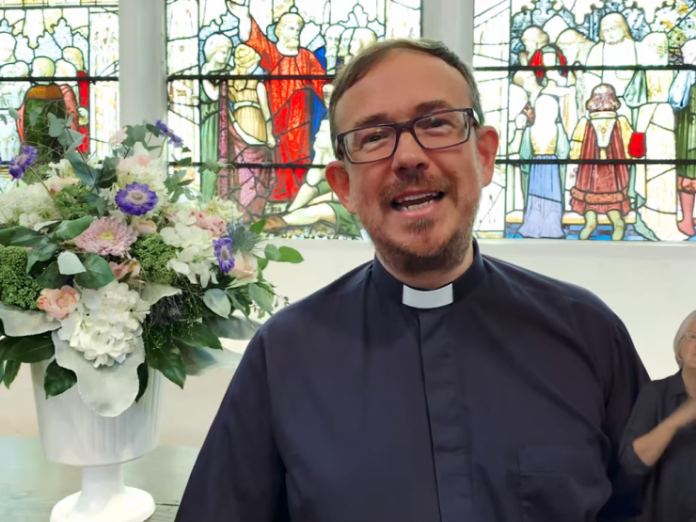Church Society director Lee Gatiss’s disclosure that he was one of two traditionalist leaders who called on the Archbishop of Canterbury to resign over same-sex blessings at a meeting at Lambeth Palace on November 3rd is revealing.
Around 25 evangelical and Anglo-Catholic leaders in the Church of England met with Justin Welby on what turned out to be, to put it mildly, a bad day at the office for the Primate of All England. Anglican LGBT campaigner Colin Coward has related what happened later that Friday when Welby met with 34 representatives of ‘progressive’ organisations.
Welby reportedly threatened to leave the second meeting when David Porter, his former chief of staff, who was chairing it, initially gave him just two minutes to respond to 90 minutes of ‘contributions’ from LGBT advocates. Porter, who stepped down as chief of staff last year but remains a ‘strategy consultant’ at Lambeth, then extended Welby’s time but according to Coward: ‘One of the progressive group members started to speak in reaction to the first point and the Archbishop responded angrily. The person, in a vulnerable state, burst into tears and eventually left the room.’
Gatiss reveals that at the traditionalist meeting those present were asked (according to a report in the Church Times by Welby himself) ‘if we had confidence in his leadership or whether he ought to resign prior to his planned retirement in two years’. ‘Both I and one colleague raised our hands to say he should resign,’ he declared.
The Revd Dr Lee Gatiss, 51, has been director of the conservative evangelical patronage trust and think tank, Church Society, since 2013 having been associate minister of St Helen’s Bishopsgate in the City of London for five years until 2009. He then spent three years researching for his doctorate in post-Reformation biblical interpretation at Peterhouse and Tyndale House, Cambridge, where he was awarded the Lightfoot Scholarship and Archbishop Cranmer Prize.
Upon his appointment to Church Society, Gatiss negotiated two noteworthy changes. His predecessor David Phillips had the title of general secretary; Gatiss managed to get that changed to the more executive-sounding director. He also succeeded in ensuring that he resided in Cambridge, rather than in the industrial town of Watford, a few miles north of London, where its head office is based and where Phillips resided.
Church Society is a well-endowed organisation. According to its annual accounts to December 31st 2022, registered at the Charity Commission, it has net assets of £3.3 million and an annual income of £270,000.
Gatiss holds the Bishop of Ely’s permission to officiate, as Church Society’s general secretary (now director) has been an ordained CofE minister since its formation in 1950 as a merger between two Anglican Protestant bodies set up in the Victorian and Edwardian eras to counter Anglo-Catholicism and Liberalism, the Church Association and the National Church League.
In 2018 Gatiss achieved a significant boost to Church Society’s status when he persuaded the conservative evangelical network, Reform, which formed in 1993 after the CofE’s General Synod voted for the ordination of women, to fold into the older organisation. Church Society had been somewhat overshadowed by Reform with its dynamic and charismatic leaders of large conservative evangelical churches in England in the persons of, for example, former vicar of Christ Fulwood, Sheffield, Philip Hacking, Reform’s first chairman, and the now octogenarian vicar (emeritus) of Jesmond Parish Church, Newcastle, David Holloway.
When the ReNew Conference of Anglican conservative evangelicals launched in 2013 as a joint venture between church leaders in the CofE and those leading congregations outside it in the Gafcon-supported Anglican Mission in England, Gatiss persuaded the insiders that it was Reform rather than Church Society, with its significant patronage influence, that had become surplus to requirements.
If Gatiss were to hand in his licence to the Bishop of Ely, it is surely most unlikely that the Church Society trustees would tell him to clear his desk as he would remain an ordained CofE minister, albeit an unlicensed one. That is decidedly not the situation of a front-line parish incumbent who resigned his CofE living over a first-order issue of Christian principle. He would sacrifice his home and his income.
Might that to some extent explain why Gatiss felt in a position to put his hand up when asked whether Welby should resign and proclaim the fact to the Anglican blogosphere? The situation of the traditionalist colleague who joined him in the gesture is unknown.
Julian Mann is a former Church of England vicar, now an evangelical journalist based in the UK.










